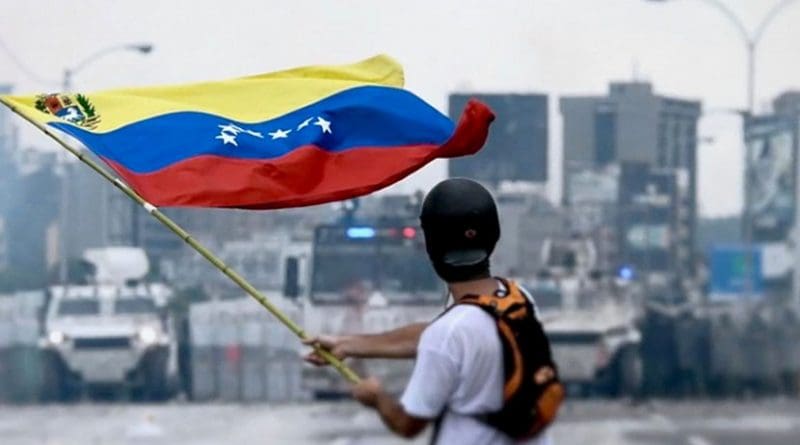EU Sanctions On Venezuela: More Harm Than Help – OpEd
Less than a fortnight after Venezuelan President Nicolas Maduro was elected to a second six-year term, the EU’s foreign ministers decided to draft new sanctions against officials close to Maduro. The EU insisted that new sanctions are designed to alleviate Venezuelans’ plight after years of deep economic crisis, and would not affect the average Venezuelan, though the bloc did not offer up any details on how it would accomplish this.
On top of the proposed new sanctions, the EU is also following the United States’ lead and demanding that Venezuela hold new presidential elections, refusing to recognise those held on 20 May. Much like Washington, Brussels took the unusual step of denouncing Venezuela’s elections before they had even occurred. This is particularly problematic given that the EU refused to send observers to monitor the recent elections. As MEP Ramon Jauregui has commented, the EU seems content with claiming that the election was essentially undemocratic, without being able to decisively prove that Venezuelans didn’t in fact vote freely.
Such a hard-line response from the European bloc is surprising, given its efforts to deescalate disputes with Tehran and other countries where decades of sanctions have proved ineffectual. The strategy also has a high probability of backfiring, and actually strengthen Maduro’s regime while further tanking the Venezuelan economy and the wellbeing of its citizens. If anything, Western sanctions will render the country even more defiant, as the president’s reaction to past censure has demonstrated. The more Maduro feels attacked, the more bombastic his rhetoric becomes – and Maduro has already pounced on the threat of further EU sanctions, deriding the European Union’s intervention as the return of colonialism.
Paying a heavy price
If past examples are any indications, this new bout of sanctions is virtually guaranteed not to touch the very people they’re designed to put pressure on—Venezuela’s ruling elite—and will instead only serve to make life harder for the Venezuelan people who are already struggling under a humanitarian and economic crisis of staggering magnitude.
Since late 2016, low global oil prices, mismanagement, and Western sanctions have sent Venezuela into the depths of a severe economic crisis. The country has the world’s worst hyperinflation, at more than 80 per cent a day. The Venezuelan currency, the bolivar, is so worthless that drawing on one and selling it as art can raise the value of the bill by 5,000 per cent. On the black market in June 2017, one US dollar fetched a little over 10,000 bolivars—by January 2018, it could be exchanged for a staggering 201,000 bolivars. Food and even the most basic medicines are in chronic short supply, even for those few who can afford them; the average Venezuelan has lost 19 pounds since the beginning of the crisis. One doctor described conditions in his hospital as “like something from the 19th century”: without soap or water, he and his colleagues are forced to wash their hands with bottled seltzer water before performing surgery. Venezuelans, especially newborns, are increasingly dying from conditions that would be easily treatable with proper care.
Sanctions will do nothing to “alleviate their plight”, no matter how loudly EU bureaucrats claim this to be the goal—rather, they will further restrict Venezuela’s ability to raise enough cash to import essential medicines. During the embargo imposed on Iraq from 1990 to 2003, for example, infant mortality shot up 150 per cent, as basic commodities became 1000 per cent more expensive.
Diplomacy first?
History has shown time and time again that sanctions, especially unilateral ones, often have the opposite effect to that intended and only serve to concentrate economic power in the hands of the state. Over the past 70 years, the U.S. has sanctioned more than 20 nations—Russia, North Korea, Cuba, Iran, Syria, Myanmar, and Côte d’Ivoire among them. Not once have these sanctions led to political change.
Instead, until South Korea offered the carrot along with the stick and proposed multilateral diplomatic negotiations, North Korea’s leadership plodded along unfazed by sanctions and the country’s nuclear program made steady progress. While leaving the ruling elite unaffected, sanctions on North Korea’s minerals trade have hit engineers, miners, truck drivers and related service providers hard. Similar disparities have played out in Iran and Cuba. American sanctions have on average increased the poverty gap in sanctioned countries by 3.8 per cent, prompting commentators to call instead for diplomacy, cultural exchanges and the strengthening of the middle class in a bid to bolster change from within.
The EU has a long history of devising and promoting such policies. Unfortunately, in this case Brussels has let an opportunity slip by copying Washington’s hard-line tactics against Venezuela rather than ratcheting tensions down and crafting a rational solution which truly would alleviate the nation’s plight.
*Carolina Muñoz grew up in the suburbs of Miami after my parents fled the escalating conflict in their native Colombia. She studied Political Science and Latin American Studies at the University of Florida, and is now working for a small non-profit in Miami and doing research on human rights in South America.

